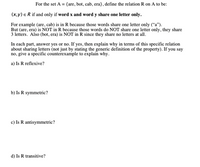
Advanced Engineering Mathematics
10th Edition
ISBN: 9780470458365
Author: Erwin Kreyszig
Publisher: Wiley, John & Sons, Incorporated
expand_more
expand_more
format_list_bulleted
Question

Transcribed Image Text:For the set A = {are, bot, cab, era}, define the relation R on A to be:
(x,y) e R if and only if word x and word y share one letter only.
For example (are, cab) is in R because those words share one letter only ("a").
But (are, era) is NOT in R because those words do NOT share one letter only, they share
3 letters. Also (bot, era) is NOT in R since they share no letters at all.
In cach part, answer yes or no. If yes, then explain why in terms of this specific relation
about sharing letters (not just by stating the generic definition of the property). If you say
a) Is R reflexive?
b) Is R symmetric?
c) Is R antisymmetric?
d) Is R transitive?
Expert Solution
This question has been solved!
Explore an expertly crafted, step-by-step solution for a thorough understanding of key concepts.
Step by stepSolved in 6 steps

Knowledge Booster
Similar questions
- i need a perfect and detailed answer pleasearrow_forwardA car dealership sells cars that were made in 2015 through 2020. Let the cars for sale be the domain of a relation R where 2 cars are related if they were made in the same year. b) Describe the partition defined by the equivalence classes. How do I do this?arrow_forward5) What is the cardinality of the set {characters in set A}? 6) Let X = {strings in A}. Find |X 7) Let X {strings in A} Name two B, CC X and two D, ECX such that... a) BUC X B = C = b) DNE #Ø E = 8) Suppose we define a relation on the set {strings in A} by making 69°F aarrow_forward
- Let S be a nonempty set. Consider the relation ~ on P(S) defined by A ~ B if AUBC = S. Is the relation an equivalence relation? Explain. If yes, identify (no need to justify) the equivalence class ofarrow_forwardprove why each relation has or does not have theproperties: reflexive, symmetric, anti-symmetric, transitive. 1) Let A = { set of all people }, relation R: A x A where R = { (a,b) | a,b ∈ A, a is at least as tall as b }arrow_forwardprove why each relation has or does not have theproperties: reflexive, symmetric, anti-symmetric, transitive. 4) Z+ is the set of positive integers, relation R: Z+x Z+, a,b,c,d ∈ Z+; (a,b),(c,d) ∈ R if an only if a + d = b + c.arrow_forward
arrow_back_ios
arrow_forward_ios
Recommended textbooks for you
 Advanced Engineering MathematicsAdvanced MathISBN:9780470458365Author:Erwin KreyszigPublisher:Wiley, John & Sons, Incorporated
Advanced Engineering MathematicsAdvanced MathISBN:9780470458365Author:Erwin KreyszigPublisher:Wiley, John & Sons, Incorporated Numerical Methods for EngineersAdvanced MathISBN:9780073397924Author:Steven C. Chapra Dr., Raymond P. CanalePublisher:McGraw-Hill Education
Numerical Methods for EngineersAdvanced MathISBN:9780073397924Author:Steven C. Chapra Dr., Raymond P. CanalePublisher:McGraw-Hill Education Introductory Mathematics for Engineering Applicat...Advanced MathISBN:9781118141809Author:Nathan KlingbeilPublisher:WILEY
Introductory Mathematics for Engineering Applicat...Advanced MathISBN:9781118141809Author:Nathan KlingbeilPublisher:WILEY Mathematics For Machine TechnologyAdvanced MathISBN:9781337798310Author:Peterson, John.Publisher:Cengage Learning,
Mathematics For Machine TechnologyAdvanced MathISBN:9781337798310Author:Peterson, John.Publisher:Cengage Learning,


Advanced Engineering Mathematics
Advanced Math
ISBN:9780470458365
Author:Erwin Kreyszig
Publisher:Wiley, John & Sons, Incorporated

Numerical Methods for Engineers
Advanced Math
ISBN:9780073397924
Author:Steven C. Chapra Dr., Raymond P. Canale
Publisher:McGraw-Hill Education

Introductory Mathematics for Engineering Applicat...
Advanced Math
ISBN:9781118141809
Author:Nathan Klingbeil
Publisher:WILEY

Mathematics For Machine Technology
Advanced Math
ISBN:9781337798310
Author:Peterson, John.
Publisher:Cengage Learning,

